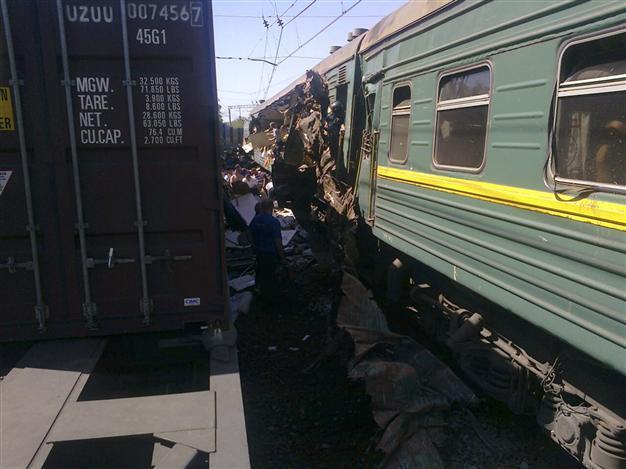At least five dead, 45 hurt in train collision near Moscow
MOSCOW - Agence France-Presse

A view shows a passenger train damaged in a collision with a freight train in Moscow region, May 20. REUTERS / Press Service of Russian Emergencies Ministry of Moscow Region
At least five people were killed and 45 injured on Tuesday after parts of a freight train derailed and collided with a passenger train south of Moscow, officials said.Fifteen of the injured were in serious condition, the emergencies ministry said.
Speaking on Russian television, a ministry official said the accident occurred around 12:30 pm local time (0830 GMT) between the towns of Bekasovo and Naro-Fominsk, about 80 kilometres (50 miles) southwest of Moscow, as the passenger train was travelling from the Russian capital to Moldova's capital Chisinau.
"According to preliminary information, 50 people were affected by the accident, including 15 people seriously injured and five killed," the official said, adding that there had been 394 passengers on the train.
A picture released by the ministry showed one side of the passenger train completely torn away, with passengers emerging from the wreckage.
"One of the carriages of the passenger train was crushed by the freight train wagons," news agency ITAR-TASS quoted rescue coordinator Vadim Andronov as saying.
At least 300 people were involved in rescue efforts, officials said, and helicopters were used to ferry the injured to hospitals.
Russian Railways said in a statement that 16 wagons of the freight train had derailed, damaging at least two carriages of the passenger train.
The cause of the accident was not immediately known. Investigators were on site and officials said a criminal probe had been launched.
Accidents to Russia's outdated infrastructure are frequent, though Russian Railways in 2010 announced it was investing $11 billion in upgrades across its network of 85,500 kilometres.
















